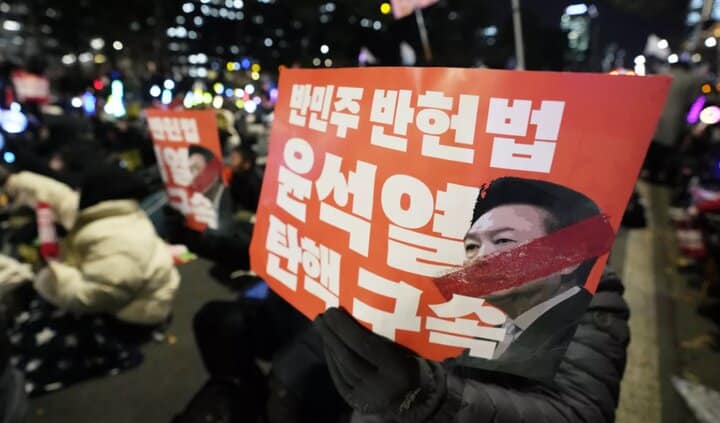The legitimacy crisis in Seoul: What are the domestic and international consequences?
In recent weeks, South Korea has witnessed intense political tensions, culminating in President Yoon Seok-yeol’s brief declaration of martial law, the first in 44 years.
The move, which was claimed to be a threat to democracy, sparked widespread backlash from parliament and society. 190 lawmakers in the 300-member parliament voted against the president’s move, paving the way for renewed calls for his resignation.
The president was eventually removed from office after lawmakers voted in favor of his impeachment in a second vote on Saturday, December 14. The motion to impeach him passed with 204 votes in favor, 85 against, three abstentions, and eight votes declared null and void.
The first motion to impeach Yoon in the National Assembly last Saturday failed to pass, leaving him in office. The majority of the ruling People’s Party had boycotted the previous impeachment motion, which failed to reach the 200-out-of-300-vote threshold. Today, however, all the deputies were present for the vote.
The powers and duties of President Yoon Seok-yeol have now been suspended, allowing the Constitutional Court to decide within 180 days whether to remove him from office or restore him to power. If he is removed from office, a national election to elect his successor must be held within 60 days.
Major media outlets in the region and around the world have analyzed each of these developments from different angles, some of which will be mentioned below;
The president’s attempt to consolidate his power base
Many media outlets have viewed the president’s declaration of martial law as an attempt to consolidate power, which has damaged his popularity and led to impeachment deliberations; a crisis that reflects the deep divisions in South Korean domestic politics.
Channel News Asia (CNA) reported on Yoon Seok-yeol’s short-term declaration of martial law, calling it an attempt to consolidate power in the face of a domestic political crisis. The outlet cited the strong reaction from parliament and civil society groups to the swift repeal of the law, stressing that the incident reflected a deep divide between the government and public opinion, and had previously raised the possibility of impeaching the president. It also noted the growing public protests and calls for Yoon to step down.
The dangers of Yoon’s authoritarian behavior: from growing public distrust to a decline in Seoul’s international credibility
The Korea Times newspaper described the recent crisis as a symbol of growing public distrust in government institutions. The outlet cited Yoon’s authoritarian policies as one reason for the crisis’s escalation and discussed the role of these tensions in changing the country’s domestic policy priorities. It also noted the impact of these events on South Korea’s international relations and the decline in the government’s credibility on the world stage.
The Asia Times newspaper has also analyzed the political tensions in the context of the country’s deeper ideological and social divisions. The media outlet emphasizes that the recent crisis highlights the political risks of using military force to suppress protests. In addition, the potential consequences for South Korea’s diplomatic relations and its regional effects are highlighted.
Reuters has covered the wave of street protests and concerns about the authoritarian tendencies of the Yun government. The media outlet emphasizes that the decision to impose martial law was met with a strong reaction from civil society and the opposition. It also considers these events a threat to the political stability of the Yun government and a sign of the country’s unstable political situation.
South Korea’s domestic crisis affects Seoul’s relations with the US, China and Japan
The Center for Strategic and International Studies (CSIS) considers the declaration of martial law to be a sign of a deep crisis in South Korea’s domestic politics. It emphasizes that the president’s action was met with a strong negative reaction from society and parliament. It also highlights the international risks of using military force for domestic repression, in a situation where North Korea could exploit this weakness. According to the Center for Strategic and International Studies, the crisis could damage South Korea’s relations with the United States, especially given that key allies were caught off guard by the move.

